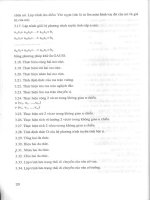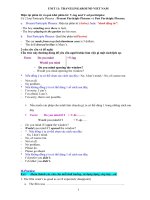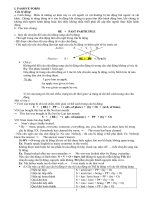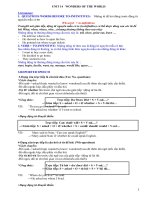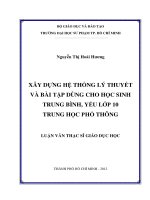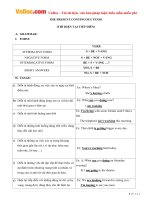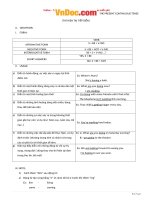Lý thuyết và bài tập unit 4 volunteer work môn tiếng anh lớp 11 sách cũ | Tiếng Anh, Lớp 11 - Ôn Luyện
Bạn đang xem bản rút gọn của tài liệu. Xem và tải ngay bản đầy đủ của tài liệu tại đây (148.94 KB, 3 trang )
<span class='text_page_counter'>(1)</span><div class='page_container' data-page=1>
<b> UNIT 4: VOLUNTEER WORK</b>
<b>E. LANGUAGE FOCUS</b>
<b>I. GERUND AND PRESENT PARTICIPLE</b>
<i><b>A / GERUND: V-ING được dùng như danh từ, có những chức năng sau:</b></i>
<i><b>1. Chủ ngữ </b></i> Ex: Swimming is difficult.
<i><b>2. Bổ ngữ</b></i> Ex: My hobby is collecting stamps
<i><b>3. Túc từ ( sau 1 số động từ - unit 3)</b></i>
Ex: I enjoy cooking.
<i><b>4. Sau giới từ Ex: He is fond of playing football.</b></i>
<i><b>B/ PRESENT PARTICIPLE: V-ING vẫn mang chức năng của động từ, được dùng như sau:</b></i>
<i><b>1. Trong các thì tiếp diễn (hiện tại tiếp diễn, QK tiếp diễn,...)</b></i>
Ex: I am reading a book.
<i><b>2. Dùng như tính từ để miêu tả danh từ</b></i>
Ex: the singing boy
<i>(adj)</i>
<i><b>3. Thay thế cho mệnh đề quan hệ</b></i>
Ex: The man who is standing in the yard is my brother.
The man standing in the yard is my brother.
<i><b>4. Giản lược mệnh đề khi có cùng chủ ngữ</b></i>
Ex: Since he left school, he's worked in a restaurant.
Leaving school, he's worked in a restaurant.
<i><b>5. Cấu trúc: spend/ waste + time / money + V-ing Ex; He spent all the money buying books.</b></i>
<i><b>6. Các động từ tri giác ( see, hear, feel, notice, watch...) + O + V-ing (nhấn mạnh sự tiếp diễn của hành động)</b></i>
Ex: We heard someone talking in the room.
<i><b>7. catch, find, keep, leave + O + V-ing</b></i>
Ex: The detective caught him stealing the watch.
<b>II. PERFECT GERUND AND PERFECT PARTICIPLE (</b>
<b>danh động từ hoàn thành và phân từ hoàn thành): </b>( HAVING + V3/ed )
<i><b> a/ Perfect gerund: Having + past participle: dùng thay thế cho gerund khi sự việc liên quan đến quá khứ. </b></i>
<i> The boy was accused of having stolen/ stealing her money.</i>
<i> She apologized for having broken / breaking my vase.</i>
ex: He was accused of having deserted his ship(= He was accused of deserting his ship) .
Ông ta bị cáo buộc là rời bỏ tàu
<b>* Sau deny : ex: He denied having been there.</b>
" n# N% f2 d& X. v- ?: R) E*
(Anh ta phủ nhận là đã có mặt ở đấy.)
<b> b/ Perfect participle: Having + past participle : phân từ hoàn thành </b>
<i> Having finished all my exercises, I went to bed.</i>
<i><b>- Phân từ hồn thành có thể được dùng để thay cho hiện tại phân từ trong câu có hai hành động xảy ra liên </b></i>
<i><b>tiếp nhau của cùng 1 chủ từ.</b></i>
Ex: Having tied/ Tying one end of the rope to his bed, he threw the other end out of the window.
1 x, U# Q- \# }* o: ~( f. m<i><b> ***Tuy nhiên nhất thiết phải dùng phân từ hồn thành (having + V3/ed) khi:</b></i>
<i><b> - Có một khoàng thời gian giữa hai hành động</b></i>
Ex: Having failed twice, he didn't want to try again.
<i><b> - Hành động đầu tiên kéo dài trong một khoảng thời gian.</b></i>
K- ~! q( }- t5 r, j, mEx: Having been his own boss for such a long time, he found it hard to accept orders from another.
<i><b> - Việc dùng hiện tại phân từ có thể gây nhầm lẫn</b></i>
Ex: Reading the instructions, he snatched up the fire extinguisher => có thể làm cho người đọc hiểu rằng hai
hành động này xảy ra đồng thời. Trong trường hợp này, chúng ta nên dùng phân từ hoàn thành.
) h* u8 \) ]3 ~. E' ^. g" r<i> Having read the instructions, he snatched up the fire extinguisher.</i>
* Cả hai dạng đều dùng để diễn tả hành động xảy ra trước hành động khác trong quá khứ.
</div>
<span class='text_page_counter'>(2)</span><div class='page_container' data-page=2>
<b>EXERCISES</b>
<b>I. Hoàn thành các câu sau đây với dạng đúng của động từ và cho biết chúng là Gerund hay Present Participle.</b>
1. ( Feel) ………... hungry, he went into the kitchen and opened the fridge.
2. My boss spends two hours a day ( travel) …...…... to work
3. ( Swim) ……...…. is my favourite sport.
4. One of life’s pleasure is ( have) ……...….breakfast in bed.
5. ( Whistle) …...……. to himself, he walked down the road.
6. In spite of ( miss) ……...… the train , we arrived on time.
7. They found the money …...…….(lye) on the ground.
8. He was trapped in a (burn)…...…….. house.
9. I’m tired of ……...……( work) eight hours a day.
10. She always puts off (go) ……...…… to the dentist.
<b>II. Hoàn thành các câu sau đây với dạng đúng của động từ là Gerund ,Present Participle, perfect participle. </b>
1. She admitted ( kill) ………..her husband.
2. I regret ( write) ………...… her that letter.
3. I enjoy ( play)…...… tennis with my friends.
4. Martin denied (see) …...….. the accused man on the day of the crime.
5. ( Tell) …...….. me that she would never speak to me again , she picked up her stuff and stormed out of the house.
6. – Will you enter for the next eloquence contest?
- (Win) …...…… twice , I don’t want to try again. Let’s give chances to other.
<b>III. Viết lại những câu sau bằng cách thay thế phần in nghiêng với Perfect Participle mà nghĩa ko đổi.</b>
1. We switched off the lights before we went to bed.
-> Having switched off the lights, we went to bed.
2. The boy asked his mother’s permission and then went out to play.
->………..
3. As he had drunk too much, he didn’t drive home himself.
->………..
4. We have done two tests today, so we are exhausted.
->………..
5. She filled the washing machine and switched it on.
->………..
6. She had been to disco the night before and she overslept in the morning.
->………..
7. We had worked in the garden all day and were sunburned in the evening.
->………..
8. She had not slept for two days and therefore she wasn’t able to concentrate.
->………..
9. Since I had not seen him for ages, I didn’t recognize him.
->………..
10. I had not ridden a horse for a long time and I found it very difficult to keep in the saddle.
->………..
11. Zoe had practiced a lot, so she was sure of her winning in the competition.
->………..
<b>IV. Viết lại các câu sau mà nghĩa không đổi.</b>
</div>
<span class='text_page_counter'>(3)</span><div class='page_container' data-page=3>
1. Nam won a scholarship. We are excited about that fact.
-> We’re ………
2. Entering the room, I was surprised at what I saw.
-> When ………
3. The volunteers couldn’t mow the old lady’s lawns
because of the rain.
-> The rain prevented ………
4. David did his homework and the went to bed.
-> After having ………
5. It is easy for anyone to learn how to cook.
-> Learning
<b>VII. Viết lại các câu sau dùng After and Before.</b>
1. I told him off. Then I realized I was wrong.
-> After …...
2. I worked very hard for the exam. Then I passed it.
-> Before………
3. First I considered what to study. Then I decided to major
in Maths. -> After……….
4. She wrote a letter. Then she went to bed.
-> After………
5. He bought a radio. First he checked the price.
-> After………
6. They argued. Then they fought.
-> After………
7. She went out for a walk. Then she had a fatal accident.
-> Before………
8. She decided to go away. First she faced the matter.
-> After……….
9. We read the book, then we wrote the assignment.
-> Before………..
10. She watched the film, then she wrote a report.
-> After………
<b>VIII. Viết lại các câu sau dùng Gerund Phrase ( cụm danh động từ)</b>
<i>1. A good way of keeping fit is to swim everyday.</i>
<i>-> Swimming everyday is a good way of keeping fit.</i>
2. It takes a long time to learn a foreign language.
->………
3. Grow your own food. It’s less expensive.
->………
4. It is uncomfortable to sit in one place for so long.
->………
5. You are not allowed to smoke here.
->………..
</div>
<!--links-->
